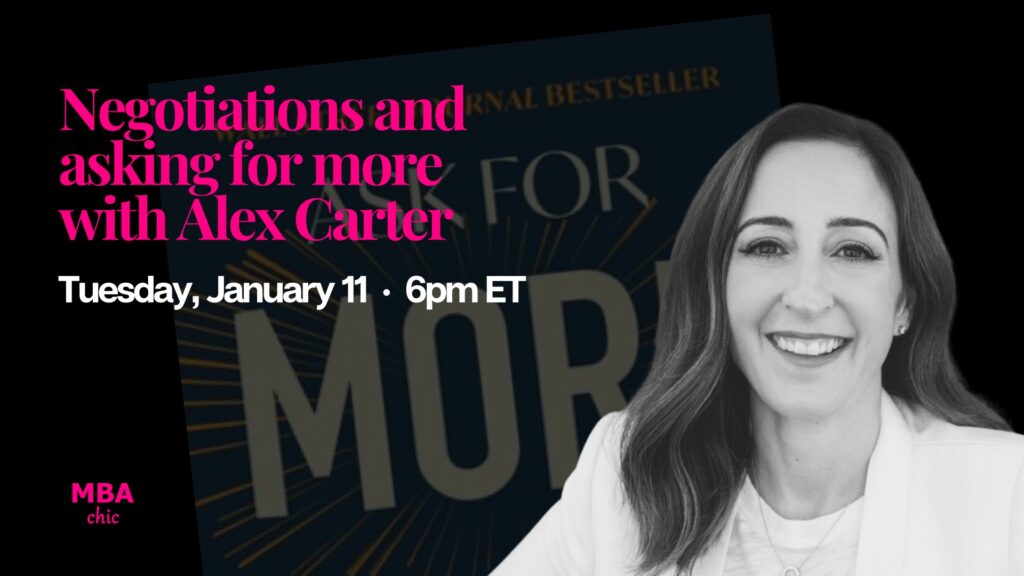On negotiations and asking for more

This is a pivotal moment in history. Coined “The Great Resignation,” professionals from every industry are experiencing a massive reevaluation of what they want out of their careers, and many are calling it quits in the pursuit of better opportunities.
For the last 40 years, the average American worker has been putting in much more into the labor market than they’ve been getting out of it. According to the Economic Policy Institute, despite Americans’ work hours increasing and our overall economic net productivity increasing by 59.7%, a typical worker’s compensation grew by only 15.8%. This means that worker productivity has grown 3.5 times as much as pay for the typical worker.
Translation? Many are ready to reassess their worth, and if you’re one of the millions revisiting your professional value, it’s critical to know your way around negotiating more than just your salary.
In this two part negotiating series, we revisit some of the insightful takeaways from our conversation with Alex Carter, negotiations expert, WSJ best-selling author and Clinical Professor of Law and Director of the Mediation Clinic at Columbia Law School.
Watch Negotiations and asking for more here.
A little bit about Alex: she attended and graduated with her JD from Columbia Law School. She has spent the last eleven years helping thousands of people negotiate better, build relationships and reach their goals. Her book Ask for More is one that Barbara Corcoran said she wished she’d read years ago, and it outlines the ten questions you need to achieve your desired outcome.
The powerful negotiating advice that changed Alex’s professional life can change yours, too.
As a leader, Alex described being an advocate for colleagues and friends above herself, feeling selfish or creeping thoughts of self-doubt when it came to her own desires for advancement. Her a-ha moment arrived years ago, when she first negotiated her salary. Like many of us at one point in our careers or another, Alex found herself in the position of receiving an offer that was slightly better than what she expected it to be. For a moment, she wondered if she should accept the initial offer but before losing her nerve, she recruited the advice of a senior mentor. The advice changed her life.
“If you’re not going to go in and ask for more for yourself, do it for the woman coming after you.
Do it for the sisterhood,”
Carter recalls.
It’s important to reframe the idea of negotiation as bigger than yourself. You are actually building a bigger table for future players. Particularly, if you are historically underrepresented in management positions, it’s vital to know your worth.

She told an anecdotal story about having a revelation about the concept of negotiation on the most unlikely of trips: her honeymoon. A tour guide on a kayaking expedition advised the group to “negotiate their kayaks over towards the beach,” and a lightbulb went off in her head.
“What am I doing when I am negotiating my kayak toward the beach? I’m steering. And in that moment I started thinking, what would my professional and personal life look like if I treated every conversation with somebody, not just the money conversation or the once a year comp discussion, but if I pictured myself steering a relationship like a kayak…thinking intentionally about each conversation as an opportunity to teach someone how to value me, even if no money is at stake, and to get to know them really well in return so we could build a relationship of trust,” says Carter.
The negotiating superpower you need to master? Ask powerful questions.
Oftentimes what distinguishes a powerful versus not-powerful question can correspond to an open versus a closed question. If you go into a conversation with a yes or no question, you give the other person an easy opportunity to say no, and you don’t gain additional information.
“Open questions start with what, how, and tell me,” Carter says. “Of all of those, tell me is the one I use first.”
Being intentional in conversations might help your professional life explode. By leading negotiations with powerful questions, you gain more information which helps create better deals, and you signal to the other party that you’re interested in hearing them out, and ultimately building a better relationship.








Loved this recap of our conversation with Alex Carter — looking forward to part II. If you attended LIVE, what were your favorite takeaways?